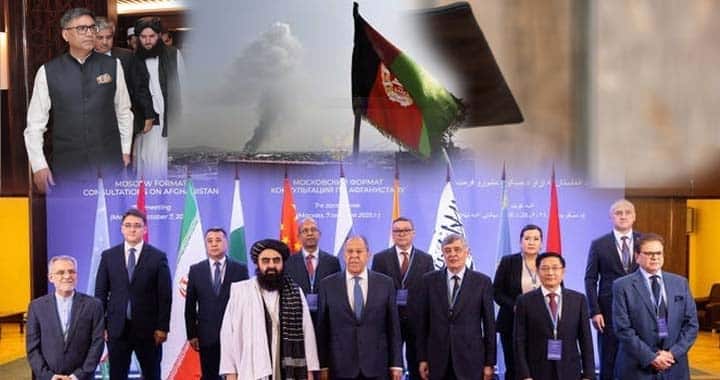As yet another regional meeting on Afghanistan concludes, this time in Moscow, hard questions remain unanswered: What has changed? And more importantly, what has improved on the ground? The Quadrilateral Meeting of Special Representatives from Pakistan, China, Russia, and Iran, like several before it, reaffirmed lofty principles, a sovereign, peaceful Afghanistan free from terrorism, but stopped short of acknowledging the hard realities that continue to fester.
Despite repeated commitments and increasingly frequent gatherings, from Moscow Format consultations to UN-sponsored forums, there has been little to no tangible progress in addressing what Pakistan and other neighbours describe as an “established fact”: that Afghan soil continues to be used by terrorist groups against foreign nations, with Pakistan being the primary victim.
Terror outfits such as the Tehreek-e-Taliban Pakistan (TTP), Baloch Liberation Army (BLA), Jaish-ul-Adl, ETIM, IS-KP, and Al-Qaeda remain operational and emboldened, many with clear footprints inside Afghanistan. These groups are not only targeting Pakistani civilians and security forces but also working to undermine regional stability.
And yet, the Taliban regime in Kabul remains in denial, refusing to acknowledge the presence of these groups on its soil, let alone act decisively against them.
“Continued dialogue and coordinated action are essential,” Pakistan’s special representative stressed at the Moscow meeting. But with zero accountability or compliance from Kabul, one must ask, dialogue with whom, and towards what end?
The UN’s Role: Enabling or Appeasing?
Adding to the alarm is the United Nations’ recent travel waiver granted to Afghanistan’s acting foreign minister, Amir Khan Muttaqi, allowing him to travel abroad, including to India.
This move comes despite the Taliban’s continued harboring of terrorist entities, regressive human rights record, and refusal to honour international norms. The decision has sparked serious questions about the UN Security Council’s credibility and neutrality, particularly when such waivers appear to benefit unaccountable regimes rather than foster compliance with global counterterrorism frameworks.
“How can the UN justify granting diplomatic privilege to the representative of a regime that hosts transnational terror?” a Pakistani security official asked. “And how can it turn a blind eye to where he’s going, India, a country credibly accused by the US and Canada of sponsoring targeted assassinations abroad?”
India and the Taliban: A New Axis of Instability?
Muttaqi’s upcoming visit to India, a country now globally scrutinised for exporting state-backed assassinations, further muddies the waters.
India, under Prime Minister Narendra Modi, stands accused by both the United States and Canada of orchestrating extrajudicial killings on foreign soil, accusations backed by credible intelligence assessments. Despite this, India continues to court the Taliban regime, hosting delegations and exploring diplomatic and economic ties.
Analysts warn that this emerging proximity between a terror-harboring regime and a terror-sponsoring state could spell deeper trouble for the region.
“We’re not looking at diplomacy here,” said one regional analyst. “We’re looking at an emerging nexus of destabilisation, Afghan Taliban plus Modi’s India, and that should deeply concern every global power interested in long-term peace and security.”
What’s Next, More Meetings or Real Action?
The Moscow meeting, like its many predecessors, reiterated the usual calls for:
Enhanced counter-terror cooperation
Strengthened regional ties
A stable, inclusive Afghanistan free from foreign influence
But none of those objectives can be realised as long as Afghanistan refuses to even admit the problem, and the international community, especially the UN, continues to reward non-compliance with diplomatic concessions.
With Pakistan’s patience increasingly tested by cross-border attacks, and the region witnessing a dangerous new alignment between terror enablers and terror sponsors, the world must ask:
Are we just going in circles?
How long can diplomacy survive without consequences?
And when will the focus shift from statements to solutions?





